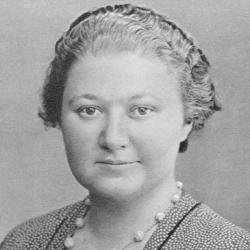Vera Menchik

Bio
Vera Menchik (1906-44) was a Russian, Czech, and finally English chess player. The first women’s world champion in chess history, she was by far the best female player of her time. Menchik was invited to several men’s tournaments, and world champion GM Max Euwe and GM Samuel Reshevsky were among the male players she defeated in games.
Early Life And Career
Born in 1906 to a Bohemian father and English mother in Moscow, Menchik learned chess at the age of nine from her father. Unfortunately, the family lost much of its livelihood in the Russian Revolution. By 1921 Vera (as well as her mother and younger sister) was living with her grandmother in England while her father was back in Bohemia.
They lived in Hastings, the site of the annual chess tournament, dating back to 1895. There Menchik’s teacher was the Hungarian master GM Geza Maroczy. She was a regular at the local tournament throughout the 1920s and '30s.

Champion
The year 1927 was an eventful one in chess. The first Chess Olympiad was held in London that summer. It was also the occasion for the first-ever women’s chess championship, won by Menchik. Later in the fall, Alexander Alekhine became the fourth official world chess champion by defeating Jose Capablanca in a match.
Menchik won her title in a tournament, and it was not close. Other than a draw against future British women’s champion Edith Michell, Menchik won every one of her games. The +10 -0 =1 score cleared the field by 1.5 points with Sweden’s Katarina Beskow finishing second at age 60.
Menchik ultimately played in seven Women’s World Championship tournaments and another two matches against Germany’s Sonja Graf. Menchik’s score in those tournaments was +78 -1 =4, including a perfect 45 undefeated, untied games in the four championship events during 1931-37.
Menchik also easily won both matches against Graf by a combined +12 -3 =5 in 1934 and 1937. In the ‘37 match against Graf, Menchik won the fine miniature below with a tactical shot.
Alekhine reportedly considered it “unfair” that a player as good as Menchik continued to have to defend her title when so clearly the best in that field. Nonetheless, defend it she did, and indeed her strength against other top women was such that if she ever let her guard down or was bored, it never showed in the results—a .988 winning percentage in the tournaments and .917 including the Graf matches.
Men’s Events
Menchik dominated other women players so thoroughly that her overall talent was undeniable, and she was regularly invited to men’s events throughout the late 1920s and the 1930s.
A 1929 tournament at Ramsgate is often considered her greatest success in a men’s event. Sharing a team with Capablanca, Maroczy, GM Akiba Rubinstein, and three others, she tied for the second-best score at +3 =4, outperforming Maroczy by a half-point.
In 1931 at Hastings Menchik won the first of her two victories against Euwe. In 1935 she defeated Reshevsky (albeit on time) at a British Chess Federation open tournament. Her overall record against both players was even.
Euwe and Reshevsky were just the two most notable members of what became known as the “Vera Menchik Club”—men who lost a game to her. Others included Edgard Colle, Sultan Khan (himself a breaker of chess barriers), and Friedrich Samisch.
Legacy
After learning chess during World War I, Menchik died in World War II, a direct casualty: She, her sister, and her mother were killed in London by a German missile attack on June 26, 1944. Only 38, she was denied not just the rest of her life but what could still have been a productive post-war career.

At a time when few women were encouraged to play chess, Menchik broke barriers by consistently playing in top-level events throughout the 1930s. She was on par with other British masters of that decade, undeniably strong players a level below the Laskers, Capablancas, and Alekhines of the world. She had an even record against George Alan Thomas in 18 games and against William Winter in six contests and was -1 against Frederick Yates in seven games.
Decades before GMs Nona Gaprindashvili and Maia Chiburdanidze, and half a century before the Polgar sisters Judit, Susan, and Sofia, Menchik paved the way for women in high-level chess. To this day the winning nation in the Women’s Olympiad is awarded the Vera Menchik Cup, a fitting way to remember the first world champion.


